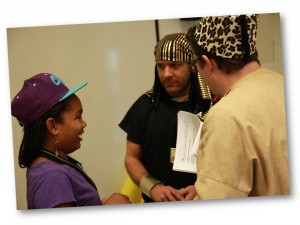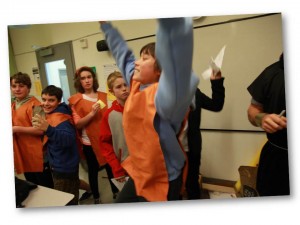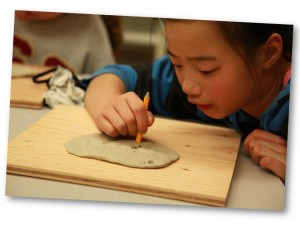 Hello all! Been away for a while… Gone but, hopefully, not forgotten! For the three of you that were wondering where I was, I was finishing my MA classes. All that’s left now is the thesis. Once that is done I’ll have finished my MA Education with a concentration in Curriculum Development. Before you wonder why I’m posting about this here instead of LinkedIn, I recently discovered a Kickstarter campaign that combines my love for all things role-playing and my passion for education, Seekers Unlimited!
Hello all! Been away for a while… Gone but, hopefully, not forgotten! For the three of you that were wondering where I was, I was finishing my MA classes. All that’s left now is the thesis. Once that is done I’ll have finished my MA Education with a concentration in Curriculum Development. Before you wonder why I’m posting about this here instead of LinkedIn, I recently discovered a Kickstarter campaign that combines my love for all things role-playing and my passion for education, Seekers Unlimited!
Their Kickstarter campaign is a project that aims to create educational live action role playing games. I am a long time role-player but have done little larping (live action role playing for the uninitiated), but I can see the benefits and how this can be put to good use in a classroom. Their Kicstarter pages explains that they have developed six edu-laps aligned to California Standards and aim to align them to the USA Common Core Standards through the Kickstarter.
The concept of engaging children in a creative endeavor, while at the same time facilitating exciting learning experiences really captures my fancy so I had to reach out to the Kickstarter project creators to get more information. Aaron Vanek, longtime larper, larp creator and author, who also happens to be the Executive Director at Seekers Unlimited, was kind enough to answer my long list of questions.
Sunglar: Aaron, your bio certainly shows your passion and experience for larps, but I’d like to hear it (read it) in your own words. Who are you and what do you do?
Aaron: Years ago, on a cross country trip to Chicago with my then-girlfriend, now wife, we stopped in a mall outside Denver. I had long hair then, and wore a red bandanna over my skull to keep my flowing locks out of my face as we rode with the windows down. Inside a store, a little girl looked up at me and asked her mother “Is he a pirate?” Her mother said, “No, he’s just a guy.” The girl replied, “Is he a pirate?”
Depending on my attire and your imagination, I could be a pirate. I could also be a starship commander, a wizard, Rasputin, Harry Houdini, or a ghost. But I’m really just a guy.
I do too many things, really, none of which makes me any (or very little) money. But they keep me exceptionally busy 24/7. Like many liberal arts college graduates, I scratch and claw for scraps. I’ve mostly been involved in motion pictures, running a film festival, freelance writing, game design, running a film festival, and of course, live action role playing.
Sunglar: A true renaissance man I see… How did you get involved in larps?
Aaron: I believe I began larping as a child, pretending to be a superhero or a Jedi knight. This was anchored while playing Dungeons & Dragons, but I set sail again when rolling dice and looking up charts became too sedentary, and I began designing very simple adventures for my friends and I to hit each other with sticks between towering eucalyptus trees.
I discovered organized larps at a game convention, but really came into my own with the “live games” created by members of Enigma, my Alma mater UCLA’s science-fiction, fantasy, horror, and gaming club. I co-designed and produced my first “official” larp in 1990, and, with a four-year hiatus while attending graduate school in Chicago, have been playing and designing/producing ever since.
Sunglar: I know that in your article COOLER THAN YOU THINK you discuss at length what a larp is and I agree that it is indeed an art form. This being an rpg blog I’m sure most readers are familiar with the concept of a larp, but for the uninitiated, how do you succinctly define a LARP?
Aaron: I define larp as: two or more people role-playing characters in a physical location without a passive audience. Every participant has at least some degree of influence on the narrative. Actions are performed, not narrated, and the “magic” happens inside a consensually-created imaginary “bubble” where everything inside the bubble is not necessarily what it really is, including the people.
My wife defines larp as “themed improvisational costume parties.”
Sunglar: Again from your bio I read you create and organize activities for very diverse groups. How did you get to develop larps for book fairs, libraries and the Girl Scouts?
Aaron: All were through contacts that knew I was making these events, and thought it would be fun to bring it to another, more traditional venue. The book fair was through Ira Ham, who co-created and runs the WyrdCon interactive storytelling convention. The library was through my friend Shawn Crosby, a.k.a. Obi-Shawn, who was doing Star Wars-themed activities for them. The Girl Scouts was through a troop leader that played in a few Melodramatic Mysteries with me, and who really enjoyed a role-playing workshop that I ran there.
I’ve been fortunate that occasionally while foraging for scraps, a friend points me towards a morsel.
Sunglar: What were the challenges of developing these for audiences that might not be familiar with larping?
Aaron: The biggest challenge was almost always convincing the adults. They often needed an explicit walk-through of what exactly was going to occur (difficult in any improv setting) before signing off. The children of almost any age almost immediately get it, and quickly dive into the fiction with aplomb.
For the Harry Potter larp I made for the library, I prepared a potions class where the Hogwarts pupils (children) would make their own potion: vinegar and food coloring with baking soda. It took a few phone calls up the chain of command before I was authorized to allow that; they wanted the kids to passively sit and watch the teacher make the potion. But that’s traditional theater, not larping. It was far more memorable that the kids got to make their own bubbling potion. A few children took them home, or wanted to. I can only hope that simple reaction intrigued a kid enough to dig further into alchemy and then chemistry, eager to see more frothing bubbles–as opposed to seeing an adult do something cool that they can’t touch, can’t smell, and can’t play with. What’s more profound, telling your friends you saw some adult make a magic potion, or that YOU made a magic potion?
Sunglar: How did you get involved in developing larps for education?
Aaron: I’ve been larping, or live action role playing, for nearly 25 years. But it wasn’t until 2006 that I realized how widespread larp was around the world. I began research on other groups and discovered the Nordic larp scene, which is very progressive. Inspired by the work of Scandinavian larpers, I started thinking about other purposes for larp besides entertainment: research, therapy, business training, and education. In 2009 I wrote “Cooler Than You Think: Understanding Live Action Role Playing” that attracted the notice of those same Nordic larp scholars and critics. One of them, J. Tuomas Harviainen, from Finland, read my essay. It inspired him to write an essay for a German larp book, which he sent me as a courtesy. Only two essays in that book are in English, one of them being “Four Reasons Why Edu-Larp Works” by Malik Hyltoft, who started a school in Denmark where the entire curriculum is larp based.

After reading the essay I wanted to try edu-larp here in America. About this same time I was playing in an entertainment larp campaign created by Christian Brown called Starship Valkyrie, where people pretend to be crew of a star destroyer fighting a war against alien invaders. Normally in those games the method to repair shields or engines is to draw a card from the customized console and assemble the parts listed on the card, e.g. 10 points of Engineering, two hypersonic screwdrivers, five widgets, etc. Get them all at the console at the same time, and it will work again.
I wondered what would happen if, instead of moving bits of fiction around, someone would need to do a math equation or solve a science problem to fix the shields.
Sunglar: A school with a curriculum based on larping sounds fascinating. What’s the combined experience in larping and education, besides you, in Seekers Unlimited?It took a few more months to find a school willing to let us test Star Seekers, based on Starship Valkyrie, but we finally did. Based on that trial run I started Seekers Unlimited. Since then we’ve run three more edu-larps in three different schools in Southern California, and I hope we’ll get the chance to do more. It’s pretty amazing to turn apathetic students into enthusiastic, engaged learners, but that’s what happens every time we’ve run an edu-larp.
Aaron: We have a great team on our board and staff. We also have a sizable advisory council that we rely on for assistance and guidance. There’s easily over 100 years of combined experience in larping or education, sometimes in both.
Sunglar: So the term has been mentioned before in the interview, and they are precisely what your Kickstarter is all about… What is an edu-larp?
Aaron: An edu-larp is simply a live action role playing event designed specifically to teach something. Fun is vital, but it’s not our primary goal. These can last a few hours or a semester, and they might be a series of separate ideas or themes, or the same theme.
Sunglar: What are the themes and topics of the edu-larps you’ve already developed?
Aaron: Star Seekers was for sixth grade math and science, though we also worked in writing, language, vocabulary, public speaking, reading comprehension, art, and probably a few more subjects. Students pretended their classroom was a starship, and they had different missions to accomplish.
Hit Seekers was for early high school math, with some remedial elements. Each team of 3-5 students were partners of a fictional record company, tasked with making the most money possible by hiring fictional musicians, booking them into fictional studios, and assigned to fictional producers. There were formulas and combinations where certain artists worked better in certain studios, or with certain producers, etc. This focused on accounting-level math, budgeting, data and chart reading, etc.
 Ancient Mesopotamia was an immersive week for a sixth grade class to portray priests, city-state governors, merchants, and astrologers during the reign of Hammurabi. We integrated many lessons into the week: history, science, language, culture, math, writing, research, public speaking, interpersonal communication, drama, creative writing, 21st Century skills…there was a lot going on; we had activities for the students for almost the entire school day for the whole week. There were a few times we didn’t have them: lunch, recess, their PE class, and a foreign language class.
Ancient Mesopotamia was an immersive week for a sixth grade class to portray priests, city-state governors, merchants, and astrologers during the reign of Hammurabi. We integrated many lessons into the week: history, science, language, culture, math, writing, research, public speaking, interpersonal communication, drama, creative writing, 21st Century skills…there was a lot going on; we had activities for the students for almost the entire school day for the whole week. There were a few times we didn’t have them: lunch, recess, their PE class, and a foreign language class.
And our six 8th grade science larps that we are offering from our Kickstarter campaign:
- Balloon Race – Students learn about forces and gravity by racing balloons across the classroom.
- Be Your Own Planet! – Students create and name their own stars, planets, and other stellar bodies in a fun game that teaches forces, gravity, mass, density, and concepts about our own solar system. Can their star systems survive interstellar dangers?
- Monster Maker – Students role-play Dr. Frankenstein by creating their own clay creatures that duel one another by asking science questions developed by the students and approved by the teacher. This edu-larp introduces students to the basic concepts of chemistry in living systems.
- Element Hero – With super powers based on the elements, students must stop villains attacking their city. An adventure that introduces students to the atom and the periodic table.
- Noir – Can you solve a mysterious death? Students role-play detectives, forensic scientists, and suspects in a series of possible crimes. Using science and the scientific method, they gather evidence and form a hypothesis about the death. On the final day a trial is held to determine the outcome of each case.
- The Great Phlogiston Debate – Students role-play actual scientists active at the end of the Age of the Enlightenment. One of the biggest scientific principles under scrutiny at that time was the theory of “phlogiston,” a substance that supposedly existed in elements that burned and was released when set afire.
Sunglar: For what grades did you design them? How adaptable are they for different grades?
 Aaron: Grades 6-10, really. They are very adaptable to other grades, at least one level higher and lower than the one we ran it for. I think of Seekers Unlimited as scenario module designers, the teachers are the GMs, and the students are the players. Like a GM can upscale or downscale a module for higher or lower level PCs, so can these edu-larps increase or decrease in complexity or difficulty.
Aaron: Grades 6-10, really. They are very adaptable to other grades, at least one level higher and lower than the one we ran it for. I think of Seekers Unlimited as scenario module designers, the teachers are the GMs, and the students are the players. Like a GM can upscale or downscale a module for higher or lower level PCs, so can these edu-larps increase or decrease in complexity or difficulty.
Sunglar: Where did you classroom-test them?
Aaron: All were for schools in Southern California; three charter schools and one public school.
Sunglar: How easy are they to integrate into the teacher’s planning?
Aaron: It’s relatively easy to work the curriculum into the teacher’s plan, as we tailor make it to what they want to do. However, it does present some difficulties if some subjects are taught by different teachers. For example, in the 8th grade science larps, I couldn’t help but bring in some math into the games. It didn’t quite work out with their algebra teacher–a different instructor. I was hoping that the math concepts relative to the science could be covered just before or during that larp, but they were on a different schedule.
This is another aspect of traditional learning that seems counter-productive to me: compartmentalizing subjects. Why not learn about gravity (science class) at the same time as the history of the scientific revolution? It’s much easier for me to design a larp that hits two or three major subjects than to create one that only focuses on a single lesson.
Sunglar: What was the response of students and teachers?
 Aaron: The responses have been remarkable. Not across the board, not all the time, but overall I think every student and teacher wants to continue using this pedagogy. Certain larps can be improved, and techniques and details can be adjusted, certainly, but as a whole the experience is overwhelmingly positive. We get a lot of students asking us if we’ll run larps for their next school year. I wish we could.
Aaron: The responses have been remarkable. Not across the board, not all the time, but overall I think every student and teacher wants to continue using this pedagogy. Certain larps can be improved, and techniques and details can be adjusted, certainly, but as a whole the experience is overwhelmingly positive. We get a lot of students asking us if we’ll run larps for their next school year. I wish we could.
Sunglar: Did you conduct any field research to validate their impact on student learning?
Aaron: Seekers Unlimited didn’t, but we had our first pre and post semester qualitative and quantitative study for the science larp. The official response is:
In short, the statistical results pertaining to liking science, feeling good at science, teamwork, and leadership showed only slight increases. These results are not surprising, however, as most of the students already liked school and science at the beginning of the study. The qualitative results showed that almost all of the students thought that the role-playing games increased their interest and competency in these areas. The effectiveness of role-playing as a method was not measured by the quantitative surveys.
The qualitative interviews revealed strong excitement for larping, praise for larp’s interactive capabilities, and an emphasis on the fun of learning through play. 100% of the 21 participants said they would like to learn through larp in the future. The authors, Sarah Lynne Bowman and Anne Standiford, plan to submit these results for publication in the International Journal of Role-playing in the next couple of months, with further publications to follow.
We would love to get more studies!
Sunglar: Once funded, what’s next for Seekers Unlimited?
 Aaron: We’ll have to fulfill our Kickstarter campaign rewards, which means improving, and preparing our science edu-larps so any teacher in any school can run them, and we have requests to do more edu-larps for more schools, and again for the same school that ran our science curriculum.
Aaron: We’ll have to fulfill our Kickstarter campaign rewards, which means improving, and preparing our science edu-larps so any teacher in any school can run them, and we have requests to do more edu-larps for more schools, and again for the same school that ran our science curriculum.
Sunglar: What other services does Seekers Unlimited provide?
Aaron: So far we’re keeping it to curriculum design. But we plan on setting up a professional development program for teachers so they can learn not only how to efficiently run the edu-larps to any class, but also how to design their own.
Sunglar: I must once again thank Aaron for the kindness of answering so many questions and for providing the photos in this post. I find the concept of edu-laps fascinating, and as an educator, believe there is much to learn from project such as this. If you can support the Kickstarter Project, visit the project page and give the gift of learning to an educational institution. If you know a school that may be interested, share the information. Since they have tax exempt status, your pledge may be partially tax deductible in the USA!
Albert Einstein said, “It is the supreme art of the teacher to awaken joy in creative expression and knowledge.” Help make these dreamers awake that very joy in every student that participates in their edu-laps!
